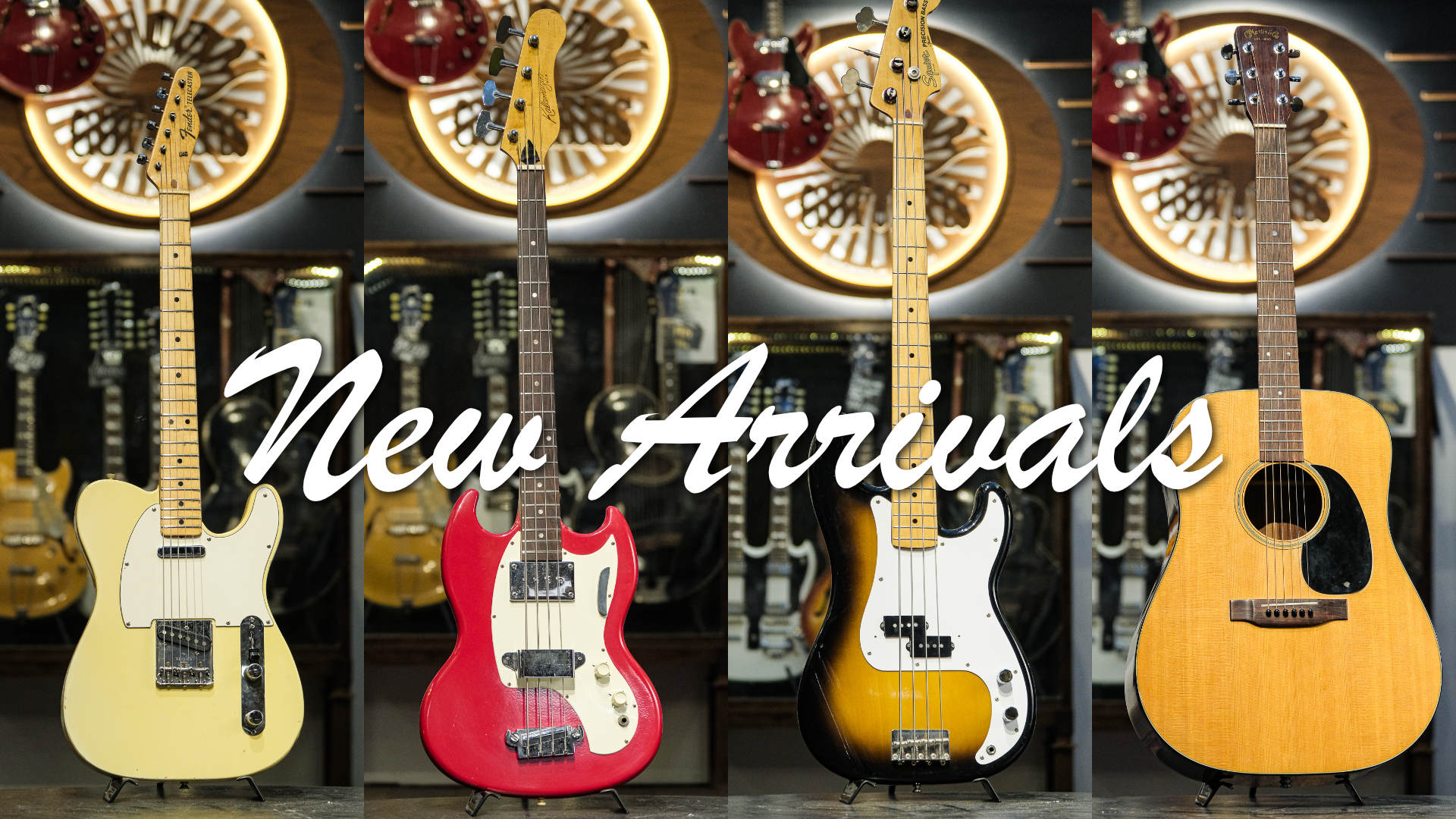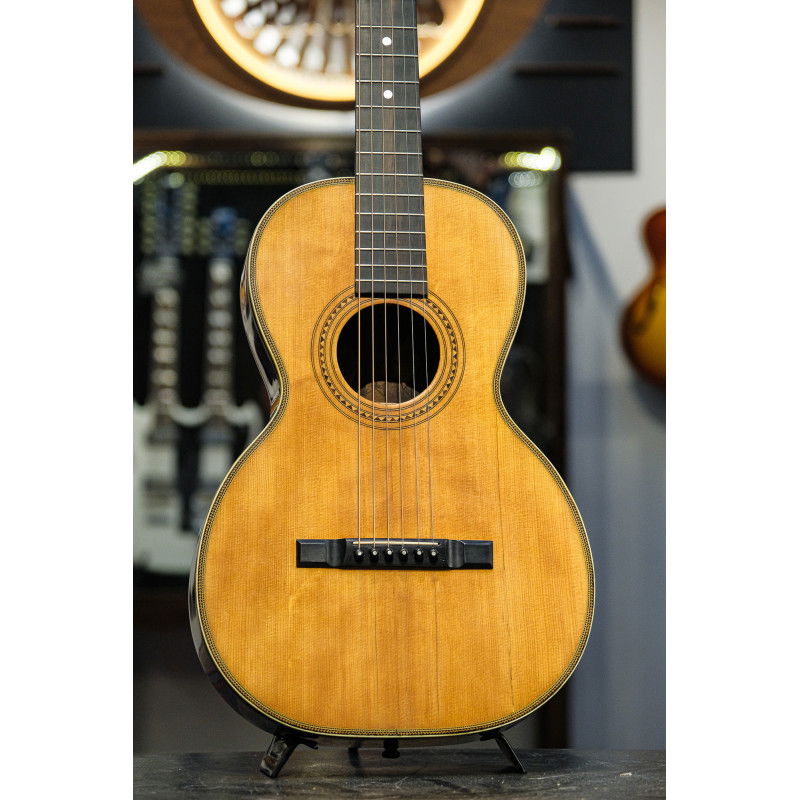
1900s Thomas Goggan & Brother Parlor natural
kr29,000.00
(tax incl.)
Made in USA
Good condition, 6,5/10, Made in USA, including modern hardcase, spruce top and beautiful rosewood in back, sides and headstock overlay, has been completely restored with what we believe is an early 1900s body (must be pre 1908 since this was the last year two of the Goggan brothers were alive at the same time and it says "& Bro") with new bracing and a new neck and new ebony fingerboard but the original headstock veneer with the Goggan logo has been saved and applied to the new neck, herringbone and checkered binding on the body, 8 repaired cracks in the top, refinished, soft-v shaped neck, slotted headstock, vintage style tuners (Stew Mac?), 3 dots in the fingerboard, some cool inlays and a stamp in the back that says T. Goggan & Bro. more info:
THOMAS GOGGAN AND BROTHERS
The historic firm of Thomas Goggan and Brothers of Galveston and San Antonio (and other branch offices) was the oldest and largest music house in the state and arguably the best-known Texas piano company. Irishman Thomas S. Goggan moved to Texas with a complete stock of musical instruments and by 1866 opened his original retail store at the corner of East Market and Twenty-second Street in Galveston.
Goggan attended St. Edwards University in Austin and Springhill College in Mobile, Alabama. He was married to wife Annie, according to the 1880 census, and they had six children that lived to adulthood. The company motto was "Everything in Music." According to what may be his first advertisement in the Dallas Herald in 1866, "Thos. Goggan, Dealer in Sheet Music, Music Books, and all kinds of Musical Instruments…has a very extensive stock of goods in his line. Persons wishing music or musical instruments cannot do better than to give him a call." Similar ads list Goggan as a retail agent for Peters, Webb and Company pianos, Mason and Hamlin organs, and the fine line of Chickering and Sons pianos.
In 1868 Goggan was the authorized agent for the U.S. Musical Review. An extensive advertiser, he also circulated his company name throughout the 1870s by sending the latest sheet music hits to major Texas newspapers such as the Dallas Herald, which in turn would announce the titles to the public and thank the Goggan firm for its patronage. Although the Galveston store remained the company headquarters, Goggan eventually established sales branches over much of the state, shipping pianos and other musical instruments by wagon and ox-team. By 1870 he had taken into business a brother, John, and the firm—now called Thos. Goggan & Bro.—was listed in ads as being the authorized dealer for Knabe as well as Steinway and Sons pianos, "The name of either being a guarantee to themselves and need no puffing," Goggan wrote about the high quality of his merchandise. But the firm did not rely solely on the prestige of name brands for sales. As another ad headed "Pianos! Pianos! Pianos!" put it, "Remember—you can buy any make of Piano at Goggan's Music Store at ten percent below Factory prices."
A branch was opened in San Antonio about 1883, and the firm's name changed to Thomas Goggan & Bros., when Goggan took into business a younger brother, Mike, born about 1854 in County Kerry, Ireland. Mike Goggan, who was working as a clerk in the Galveston store in 1880, assumed charge of the San Antonio store, which grew in importance as a center of distribution, especially because El Paso and Amarillo were good markets for the firm. The San Antonio store, called Goggan Palace of Music, was located at Broadway and Travis in the early twentieth century, and sold radios, phonographs, records, sheet music, and string and wind instruments, as well as all manner of pianos, from uprights and grands to player and reproducing pianos. The piano brands sold were nationally famous: Steinway and Sons, A. B. Chase, Schumann, Weber, Aeolian, Duo-Art, and also "Goggan." The store used the slogan "Tell the Truth and Shame the Devil" and was a meeting place for many music celebrities.
By 1885 Goggan ads announced the firm as the "largest piano house in Texas" and the "oldest music house in Texas." Nevertheless, the company's history is sketchy. City directories indicate the San Antonio store changed addresses at least twice, though the Galveston headquarters apparently remained at its original location. Branch offices also opened in Dallas, Waco, Austin, and Houston. According to his obituary in the San Antonio Express (November 27, 1914), Mike Goggan left the company and established himself in independent business in San Antonio after the deaths of his brothers (Thomas, 1903, and John, 1908), by which time the family firm had been incorporated and he had severed his connection with it. The Texas State Gazetteer and Business Directory for 1914–15 identifies Mrs. John Goggan as president of Thomas Goggan & Bros., Incorporated, with Thomas S. Goggan (a son of Thomas) as vice president and secretary. The directory also listed Mike Goggan's Musical Goods, located at 225 E. Houston in San Antonio.
Goggan's music publishing stopped in Galveston in 1930. Some business operations in retail branches, however, continued into the mid-twentieth century.
There is no doubt that Thomas Goggan & Bros. was a reputable and extensive dealer of musical instruments, and they may have manufactured pianos as well, though research sources present conflicting evidence. Available city directories for Galveston and San Antonio show addresses for sales offices and showrooms, but not for a factory. Alfred Dolge did not mention the Goggan firm in his comprehensive two-volume history, Pianos and Their Makers, published in 1911 and 1913. Pierce Piano Atlas, the most reliable trade compendium of serial numbers for all American pianos manufactured, contains the name Thomas Goggan & Bros., but with no serial numbers, which usually indicates that the firm was not a manufacturer.
Yet the company advertised "Goggan" pianos for sale. It is likely that the Goggans took advantage of an accepted trade practice quite common in the years before World War I—that of stenciling the dealer's name on a "nameless" piano manufactured for this purpose by an independent company—much as grocery chains sell generic merchandise under their own house labels. If the "Goggan" piano was a stencil, it most likely was manufactured by the Aeolian, Weber Piano and Pianola Company of New York, since this huge conglomerate supplied most of the various brands of instruments that the Goggan brothers sold and was a giant producer of "nameless" pianos available for dealers to stencil and sell as their own brand.
Nevertheless, there are rare individual pianos still extant that display "Thos. Goggan & Bros. Texas" cast into the iron string-plate (instead of just being stenciled on the fall board or on the plate). At least one known piano still in use in Texas in the twenty-first century has the name "Thos. Goggan & Bros." and a four-digit number cast in iron in the sound board. This evidence suggests two alternatives to stenciling (especially given that Mike Goggan was a noted campaigner against stencil pianos, which were often of questionable quality). Either the firm did indeed manufacture pianos at some point, or it purchased made-to-order parts (i.e. string-plates, cases, keys, actions, sounding boards, etc.) from the numerous piano supply houses located in the North and Northeast and assembled the "Goggan" piano rather than actually making it. This was also a common trade practice, and unlike stenciling, usually resulted in instruments of at least medium quality. Nevertheless, piano production figures for the Thos. S. Goggan & Bros., if any, remain unknown, a conundrum made further elusive by Alfred Dolge's and the Pierce Piano Atlas's silence on the matter
Data sheet
- Finish
- natural
- Year
- 1900s


































































































